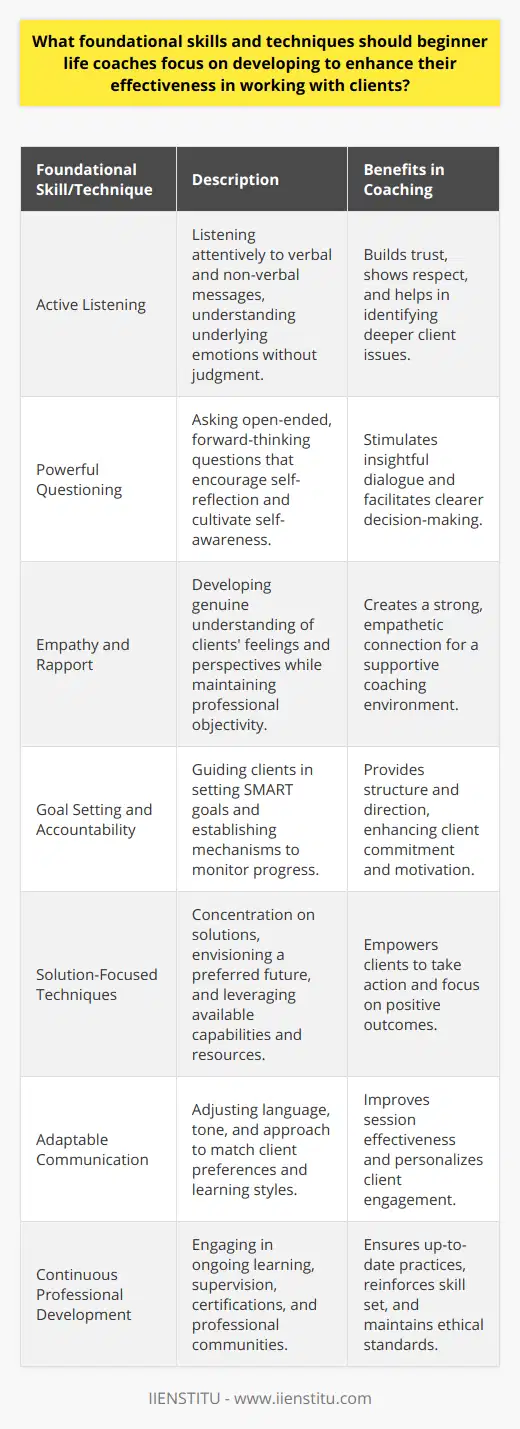
As a new life coach, one of the most daunting tasks can be finding your first client. It's a common question that many aspiring coaches ask themselves: "how to get your first life coaching client?" While it may seem challenging at first, there are several effective strategies you can employ to attract clients and build a thriving coaching practice.
When I first started my journey as a life coach, I found myself in a similar situation. I had just completed my coaching certification and was eager to begin working with clients, but I didn't know where to start. I remember feeling overwhelmed and unsure of how to approach the task of finding my first client.
One of the first things I learned was the importance of identifying your target market. As a new coach, it's essential to have a clear understanding of who you want to work with and what unique value you can offer them. Take some time to reflect on your own experiences, passions, and areas of expertise. What types of people do you feel most drawn to working with? What specific challenges or goals do you feel equipped to help them with?
For example, when I first started coaching, I knew that I wanted to work with young professionals who were struggling to find balance and purpose in their lives. I had personally experienced the challenges of navigating career transitions and finding fulfillment, so I felt uniquely qualified to support others in similar situations.
Once you have a clear idea of your target market, it's time to start building relationships and networking within your community. Attend local events, join professional organizations, and seek out opportunities to connect with potential clients. Don't be afraid to put yourself out there and share your passion for coaching with others.
I remember attending a local networking event for young professionals shortly after starting my coaching business. I was nervous at first, but I forced myself to strike up conversations with as many people as possible. I shared my story and my vision for helping others achieve their goals, and I was amazed at the positive response I received. Several people expressed interest in learning more about my coaching services, and one even became my first paying client!
Another key strategy for attracting clients is to leverage the power of social media. Platforms like LinkedIn, Facebook, and Instagram provide valuable opportunities to connect with potential clients and showcase your expertise. Start by creating a professional profile that clearly communicates your coaching niche and the value you offer. Share helpful content, engage with your followers, and don't be afraid to reach out to individuals who you think could benefit from your services.
When I first started building my online presence, I made a point to post regularly on LinkedIn and share articles and insights related to personal development and career growth. I also joined several online communities for young professionals and actively participated in discussions related to the challenges they were facing. Through these efforts, I was able to attract several new clients who resonated with my message and approach.
In addition to networking and social media, creating a website or blog can be a powerful way to establish your credibility and attract potential clients. Your website should clearly communicate your coaching philosophy, services, and unique value proposition. Consider including testimonials from past clients, as well as a clear call-to-action for individuals who are interested in working with you.
When I launched my coaching website, I made sure to include a detailed "About" page that shared my personal story and the experiences that led me to become a coach. I also created a blog where I regularly shared insights and tips related to personal growth and career development. By providing valuable content and establishing myself as a thought leader in my niche, I was able to attract a steady stream of new clients.
Another effective strategy for getting your first client is to offer free consultations or introductory sessions. This allows potential clients to get a sense of your coaching style and approach, and it gives you an opportunity to demonstrate the value you can provide. Be sure to clearly communicate the purpose and format of these sessions, and have a plan in place for following up with individuals who express interest in working with you further.
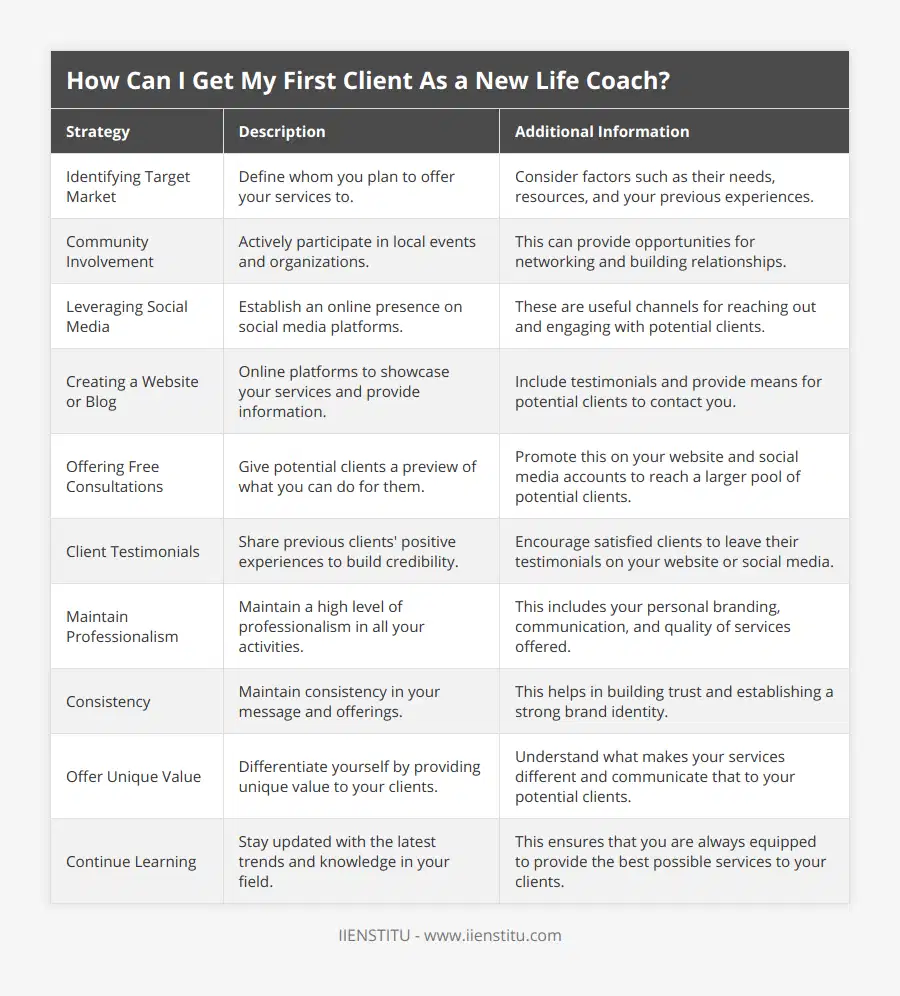
When I first started offering free consultations, I was surprised at how many people took me up on the offer. I made sure to approach each session with the same level of professionalism and care that I would a paid session, and I focused on providing as much value as possible in the limited time we had together. Several of these individuals went on to become regular clients, and many others referred friends and colleagues to me based on their positive experience.
As you work to build your coaching practice, it's important to remember that building credibility and trust takes time. Don't get discouraged if you don't land your first client right away. Keep putting yourself out there, providing value, and building relationships, and the clients will come.
One of the things that helped me stay motivated in the early days of my coaching business was to celebrate the small wins along the way. Whether it was a positive response to a social media post, a referral from a satisfied client, or simply a meaningful conversation with someone in my network, I made a point to acknowledge and appreciate each step forward.
Another key factor in building a successful coaching practice is to continually invest in your own growth and development. Attend workshops and conferences, read books and articles related to your niche, and seek out opportunities to learn from more experienced coaches. The more you grow and evolve as a coach, the more value you'll be able to provide to your clients.
One of the most transformative experiences for me as a new coach was attending a weekend-long workshop on the psychology of behavior change. Not only did I gain valuable insights and tools to use with my clients, but I also had the opportunity to connect with other coaches from around the country who were on a similar journey. Those relationships have continued to be a source of support and inspiration for me as I've grown my coaching practice.
In addition to investing in your own development, it's also important to stay focused on your mission and purpose as a coach. Remember why you got into coaching in the first place, and let that drive you forward even when things get tough. Keep your vision for your ideal coaching practice front and center, and trust that by staying true to yourself and your values, you'll attract the right clients and opportunities.
As I've grown my coaching practice over the years, I've learned that authenticity and vulnerability are key to building deep, meaningful relationships with clients. Don't be afraid to share your own struggles and challenges, and to admit when you don't have all the answers. Your clients will appreciate your honesty and will be more likely to trust you as a result.
One of the most powerful moments I've experienced as a coach was when a client shared with me that she had been struggling with anxiety and self-doubt for years, but had never felt safe enough to talk about it with anyone before. By creating a space of non-judgment and acceptance, I was able to help her work through those challenges and ultimately make significant positive changes in her life.
Ultimately, building a successful coaching practice requires a combination of hard work, persistence, and a willingness to put yourself out there. It's not always easy, but the rewards of helping others achieve their goals and live their best lives are well worth the effort.
As you work to get your first life coaching client, remember to:
Identify your target market and unique value proposition
Get involved in your local community and build relationships with potential clients
Use social media to your advantage by sharing valuable content and engaging with your followers
Create a website or blog to showcase your expertise and establish your credibility
Offer free consultations or introductory sessions to demonstrate the value you can provide
Stay focused on your mission and purpose, and continually invest in your own growth and development
By following these best marketing strategies for new life coaches, you'll be well on your way to attracting your ideal coaching client and launching a successful life coaching business. Trust in the process, stay true to yourself, and don't be afraid to put yourself out there. Your first client is just around the corner!
References:
Smith, J. (2018). The Art of Coaching: A Comprehensive Guide to Mastering the Craft. New York, NY: HarperCollins Publishers.
Johnson, L. (2020). Building a Thriving Coaching Practice: Proven Strategies for Success. London, UK: Routledge.
Davis, S. (2019). The Psychology of Behavior Change: Insights and Strategies for Coaches. San Francisco, CA: Jossey-Bass.
Wilson, R. (2017). Authentic Leadership: The Key to Building Trust and Rapport with Clients. Boston, MA: Harvard Business Review Press.
Thompson, K. (2021). Marketing for Coaches: A Step-by-Step Guide to Attracting and Retaining Clients. Chicago, IL: American Bar Association.
Frequently Asked Questions
What are the best ways to market yourself as a life coach?
There are a number of ways to market yourself as a life coach. One of the most important things, however, is to create a strong personal brand. This means developing a clear message about what you do and why you're unique. You can then use this message to create marketing materials that communicate your brand's promise effectively.
Another key element of marketing yourself as a life coach is networking. Attend conferences and other events where life coaches are likely to be in attendance, and meet people in your field. Start building relationships with other coaches and see how you can help each other. Finally, use online platforms such as LinkedIn and Twitter to reach out to potential clients and connect with them online.
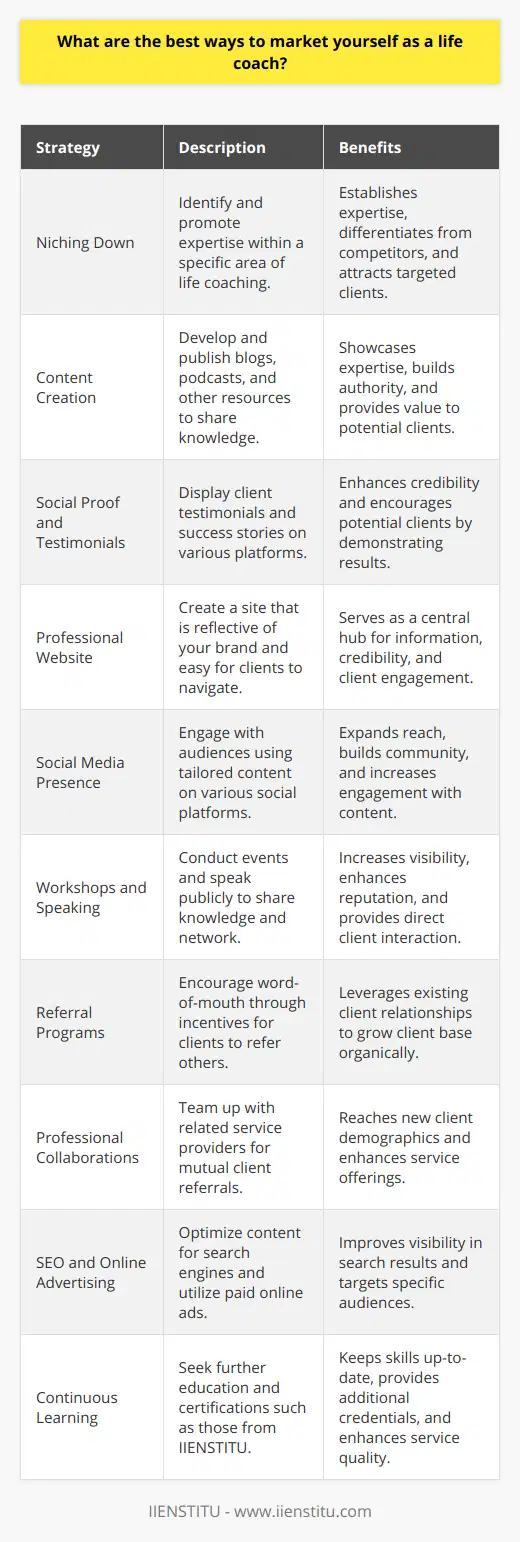
How can you differentiate yourself from other life coaches?
This is a great question! There are a few ways to differentiate yourself from other life coaches. One is to specialize in a certain area, such as health and wellness, relationships, or career coaching. You could also focus on a certain age group or demographic, such as millennials, parents of young children, or corporate executives.
Another way to set yourself apart is to develop your own unique coaching style. Perhaps you're especially good at helping clients set goals and achieve them, or you have a knack for giving helpful feedback and constructive criticism. Whatever your specialty or style may be, be sure to emphasize these things when marketing yourself as a life coach.
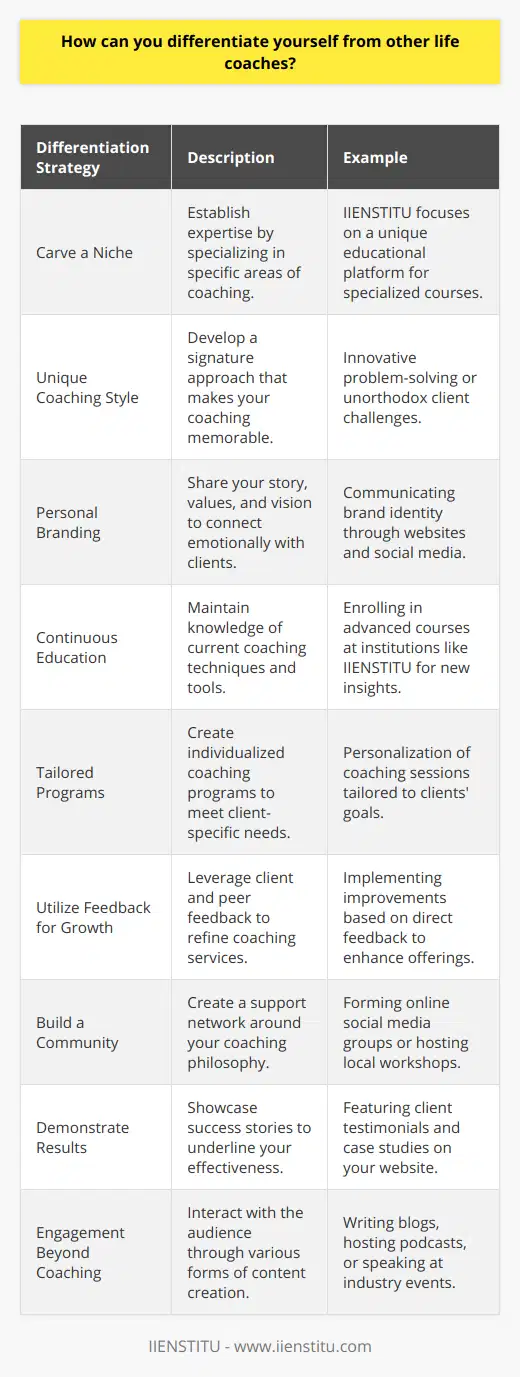
What do you think is the most important thing for a life coach to have?
The most important thing for a life coach to have is the ability to be authentic and real with their clients. This means being able to share their own stories and experiences honestly, and also being able to listen attentively and provide support without judgment.
Coaching is all about creating a safe space for clients to explore their thoughts and feelings, so it's essential that coaches can provide an emotionally safe environment. Clients need to feel like they can be themselves without fear of judgement, and they need to trust that their coach will help them find their own solutions rather than giving them advice or telling them what to do.
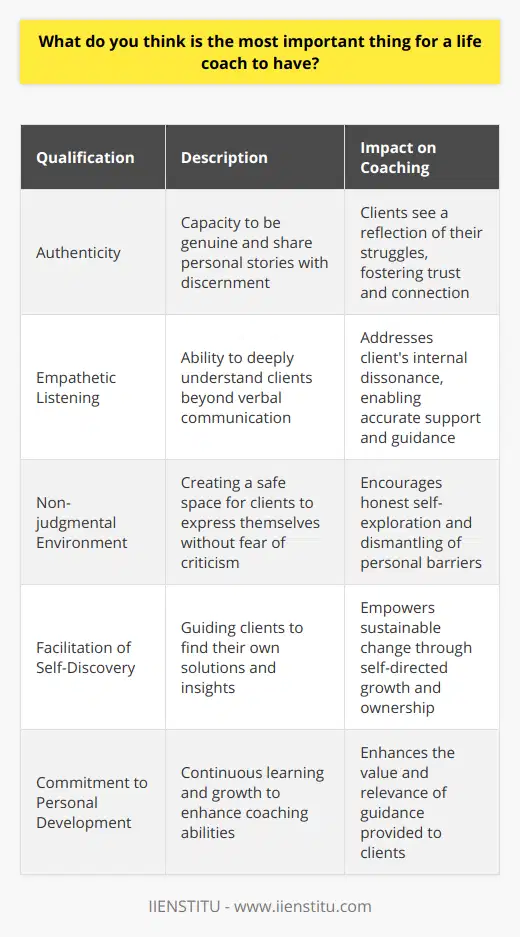
Do you think experience is necessary in order to be a successful life coach?
Yes, experience is certainly necessary in order to be a successful life coach. It's important to have personal experience with the challenges that clients face, and to have undergone your own personal growth and development so that you can share your insights and wisdom with others. In addition, life coaching is a profession that requires ongoing training and education in order to stay current on the latest research and approaches. So it's also important for coaches to commit to continuing their professional development.
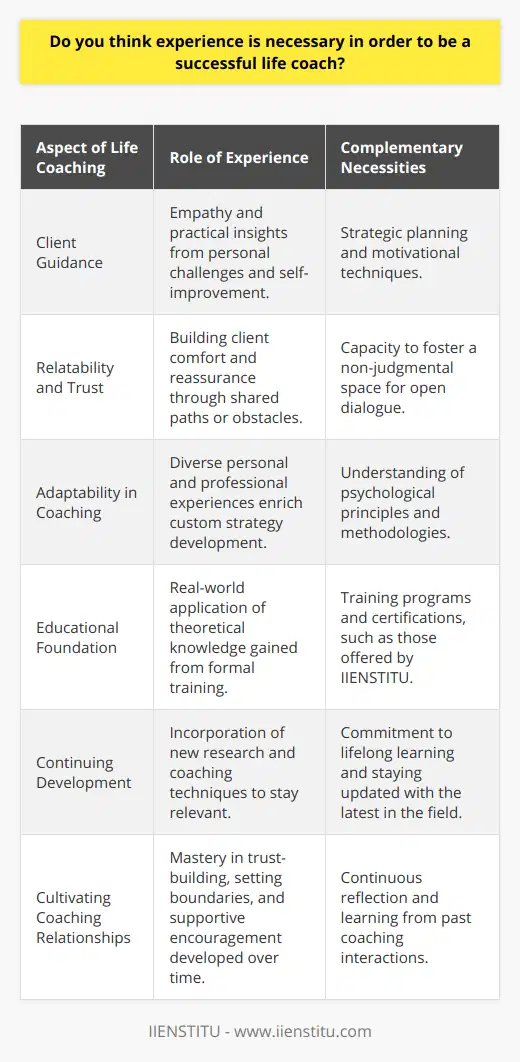
How did you go about finding your first clients as a life coach?
I started by looking for groups that were already meeting in person, and then cold-called the leaders of those groups to see if they were interested in having me lead a session for their group.
I also created a free introductory e-course on life coaching, and then emailed the list of people who signed up for the course to offer individual coaching sessions. Finally, I placed ads on websites that catered to people who were interested in personal growth and self-improvement.
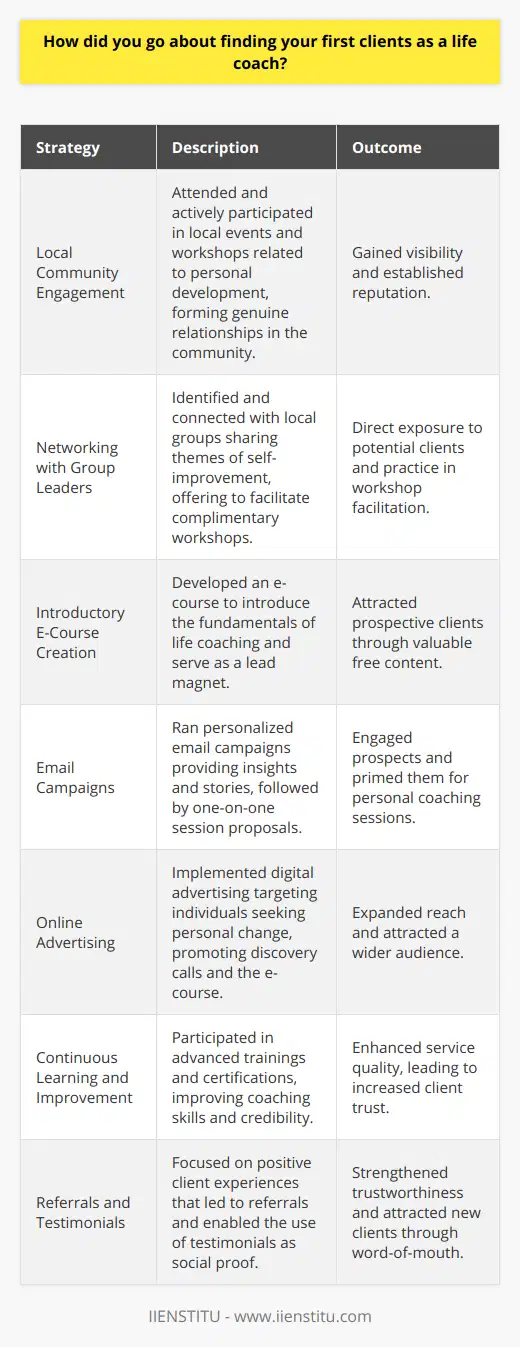
What methods do you recommend for contacting friends and family members as potential clients?
There are a few different methods you can use to contact friends and family members as potential customers. The most common ways are through phone calls, emails, or social media platforms like Facebook or Twitter.
Each method has its own advantages and disadvantages. For example, phone calls are personal and allow for real-time communication, but they can be expensive if you're calling long-distance numbers. Emails are less expensive and provide a written record of the conversation, but can be less personal than a phone call. And social media platforms offer the widest range of options for contacting people, including making posts on their timelines or sending them messages, but can be less effective than other methods if the recipient doesn't check their account often.
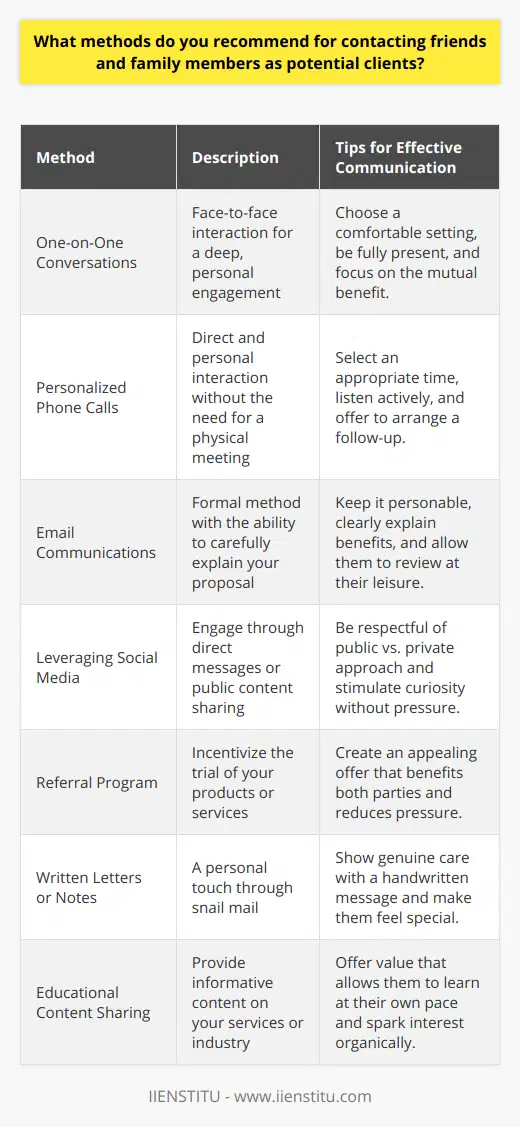
How do life coaches effectively engage with and guide their first clients?
Understanding Client Needs
To effectively engage with and guide their first clients, life coaches must begin by understanding their clients' needs, values, and goals. By actively listening and asking open-ended questions, coaches can identify clients' specific challenges and areas of growth, establishing a solid foundation for the coaching relationship.
Building Rapport
Once a life coach has a clear understanding of the client's needs, developing rapport and trust is vital. Through verbal and non-verbal communication, empathy, and validation, the coach can create a safe environment for clients to be open and honest about their thoughts, feelings, and aspirations. This open communication facilitates exploration of the client's current situation and identification of possible solutions.
Setting Realistic Goals
An essential step in guiding clients is assisting in setting realistic, achievable goals. Life coaches work with clients to break down complex objectives into manageable, specific actions. This goal-setting process empowers clients to take control of their progress and fosters a sense of accomplishment as they make steady progress toward fulfilling their ambitions.
Monitoring Progress
Ongoing feedback and evaluation are crucial for an effective coaching relationship. Life coaches must provide constructive, honest feedback and support clients in assessing their own progress. By regularly discussing and reviewing their achievements, clients can acknowledge their successes, identify areas for continued development, and maintain motivation to persevere in their journey.
Adapting the Coaching Approach
Lastly, a life coach should be prepared to adapt their coaching approach to the unique needs of each client. A successful life coach recognizes the importance of personalizing their techniques and tools to the individual, ensuring that the coaching process remains relevant and effectual. As clients evolve and grow throughout the coaching journey, the coach must be flexible and responsive to these changes, continually tailoring the sessions to the client's current aspirations and challenges.
In conclusion, life coaches guide their first clients by understanding their needs, building rapport, setting realistic goals, monitoring progress, and adapting their approach. By implementing these strategies, life coaches can help clients navigate various challenges, fostering personal growth and ultimately, realizing their potential.
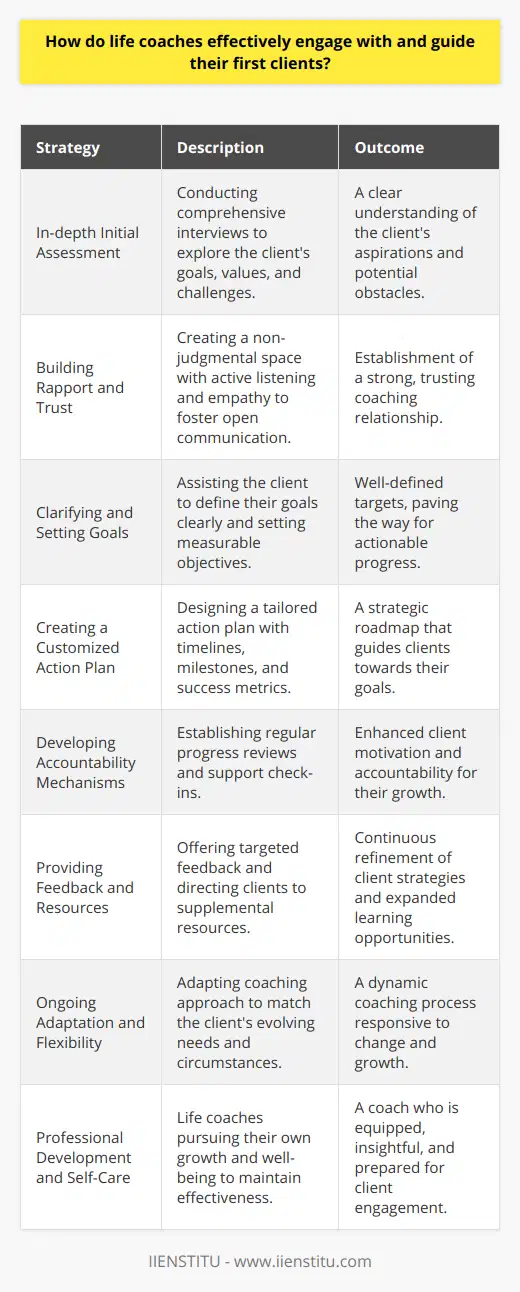
What are the key factors to consider when determining appropriate pricing for life coaching services, particularly for a beginner?
Market Research and Target Audience
When determining appropriate pricing for life coaching services as a beginner, the first key factor to consider is conducting thorough market research. This includes investigating competitors' pricing, the target audience's average income, and the demand for such services in the market. These data points will provide insight into an optimal price point that aligns with both the market and potential clients' financial capabilities, without undervaluing the coach's time and effort.
Cost of Providing Services
Another critical aspect to consider when pricing life coaching services is the cost associated with providing these services. This includes expenses such as office rent, travel, communication, marketing, professional development, and any software or tools required for effective coaching. By calculating the total cost of providing services and determining the desired profit margin, life coaches can establish a pricing structure that ensures sustainability and financial viability.
Experience and Credentials
Life coaches who are just starting should take into account their professional experience and credentials in their pricing model. As a beginner, you might have limited experience or lack advanced certifications, which could justify offering more competitive pricing to attract clients. As the life coach gains more experience and achieves more significant results for clients, they can gradually increase their pricing to reflect their increased value in the market.
Value Proposition and Service Offerings
In addition to the factors mentioned earlier, life coaches need to consider their value proposition and service offerings when determining appropriate pricing. Coaches should clearly outline the benefits that potential clients will gain from their services and how these benefits differentiate them from competitors. Life coaches that offer services in specialized areas or provide additional support, such as workshops or online courses, can charge higher prices due to their enhanced value proposition.
Flexible Pricing Options
Lastly, it is beneficial for life coaches to offer various pricing options to accommodate clients with different financial situations and coaching requirements. By offering different service packages, such as individual sessions or bundled sessions, life coaches can serve a broader client base and potentially attract clients who might have been hesitant due to the cost. Additionally, implementing a sliding scale or adjusting prices for clients with financial constraints can demonstrate empathy and commitment to their clients' wellbeing.
In conclusion, determining appropriate pricing for life coaching services involves considering several factors, such as market research, costs, experience, credentials, value proposition, and flexible pricing options. A thorough understanding of these elements allows life coaches, particularly beginners, to navigate the market, attract clients, and establish a financially sustainable business.
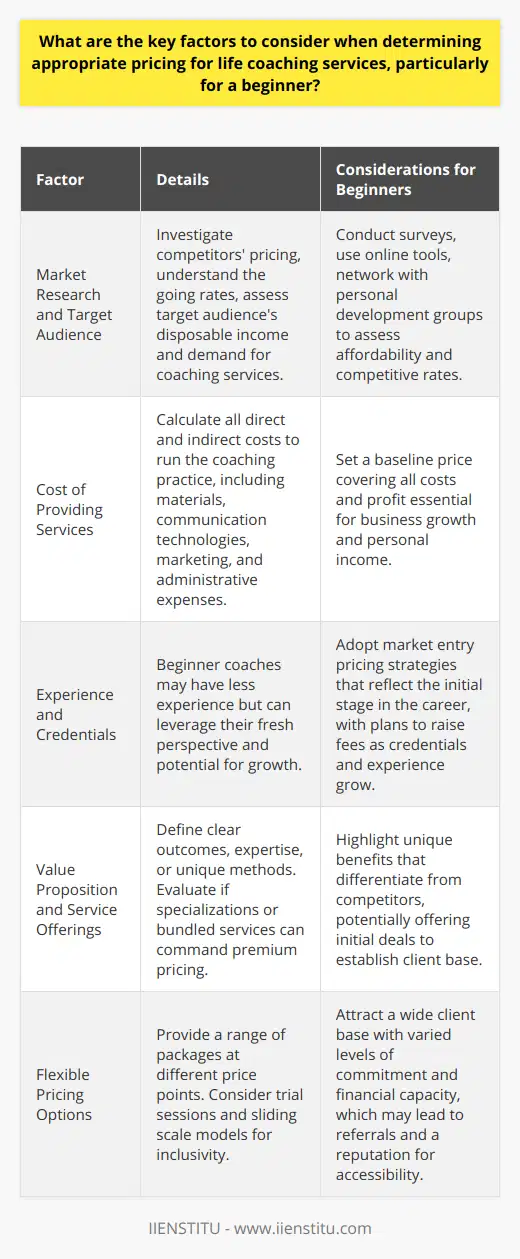
In what ways can a new life coach efficiently implement marketing strategies to establish themselves within the industry?
Understanding the Target Audience
A new life coach can efficiently implement marketing strategies by first understanding their target audience. This process may involve conducting market research, utilizing online analytics tools and engaging with potential clients on various communication platforms. By gaining insights into their client’s preferences, pain points, and demographics, life coaches can tailor their services and content to better resonate with their target market.
Leveraging Digital Platforms
In today's digital age, life coaches can take advantage of various platforms, such as social media, blogging, and email marketing, to disseminate valuable content to a broader audience. Social media can be especially helpful in connecting with potential clients, as it allows face-to-face interactions that promote trust and forge more meaningful relationships. Moreover, blogging can showcase a life coach's expertise and knowledge, while email marketing can ensure consistent communication and updates to an engaged subscriber base.
Fostering Strategic Partnerships
Collaborating with industry influencers and forming partnerships can help a new life coach gain exposure and establish their credibility in the field. These partnerships can take the form of co-hosting webinars, writing guest blog posts, or exchanging referrals with complementary businesses. Building relationships with key players can also serve as an endorsement of the life coach's services, further cementing their presence in the industry.
Promoting Testimonials and Success Stories
To establish their credibility and gain trust from potential clients, a new life coach should highlight testimonials and success stories from satisfied clients. This can entail posting reviews on their website, sharing success stories on social media, or including testimonials in marketing materials. By showcasing real-life examples of their expertise, life coaches can demonstrate their ability to help clients achieve their desired outcomes.
Offering Unique Value Propositions
Differentiation is crucial for a new life coach to stand out amidst the competition in the industry. To achieve this, they can focus on offering unique value propositions by emphasizing their specialized knowledge or unique coaching methods. By consistently communicating their differentiated offerings through various marketing strategies, a life coach can create a strong brand identity and reinforce their expertise to their target audience.
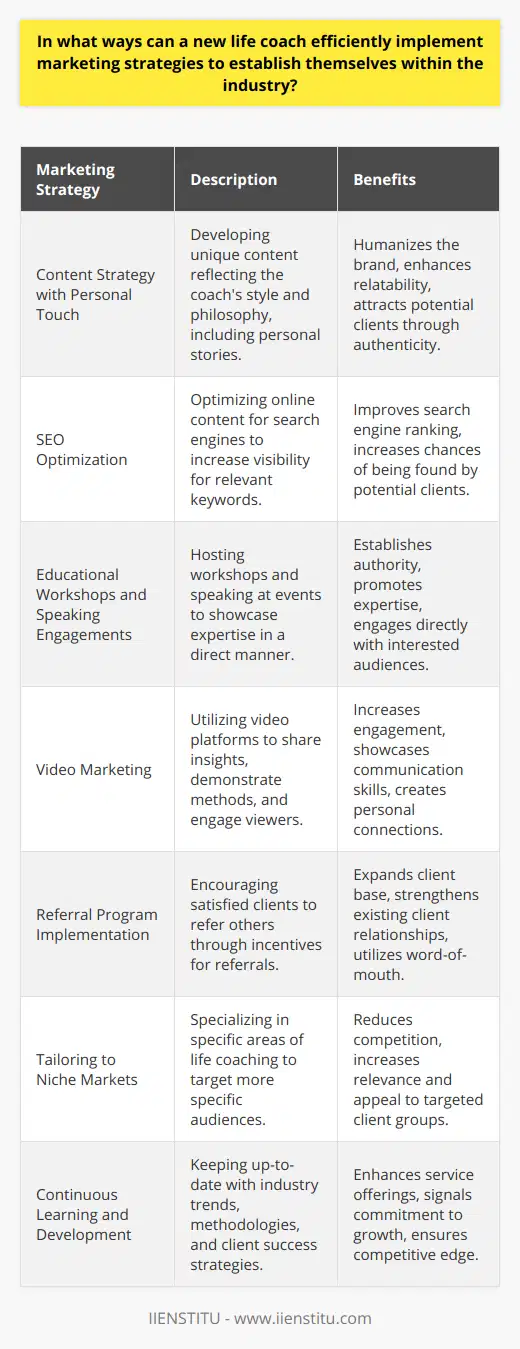
How can a life coach effectively build rapport and establish trust with their first clients?
Building Rapport through Active Listening
One initial strategy life coaches can utilize to establish rapport and trust with new clients is active listening. By attentively and empathetically engaging in the conversation, coaches can demonstrate genuine interest in the client's concerns and aspirations. This process requires more than maintaining eye contact and nodding; it encompasses clarifying the client's narrative, asking open-ended questions, and paraphrasing their statements to confirm understanding, thereby ensuring that the individual feels validated and heard.
Leveraging Empathy and Congruence
Incorporating empathy and congruence into interactions with first-time clients is another fundamental aspect of building rapport. Coaches must strive to place themselves in their client's position, understanding their emotions, thoughts, perspectives, and actions. Showing empathy helps clients feel supported and creates a secure environment for them to share openly. Simultaneously, congruence establishes a genuine connection, with coaches showing their authentic selves and avoiding incongruences between their words and actions.
Emphasizing Confidentiality
A life coach can instill trust by emphasizing confidentiality, creating a safe space for honest communication. Upon initiating contact, coaches must clarify the extent and boundaries of confidentiality, reassuring clients that their privacy will be respected. Moreover, in the event of needing to share client information, coaches must first obtain consent, being transparent about who the information will be shared with and why.
Establishing a Non-judgmental Environment
To effectively build rapport with new clients, a life coach must create a non-judgmental atmosphere. Ensuring that conversations are free from preconceived notions and biases promotes an environment that encourages clients to openly discuss their fears, challenges, hopes, and goals. This approach involves active listening, empathy, and withholding judgment to welcome diverse opinions and experiences.
Cultivating a Collaborative Approach
Lastly, adopting a collaborative approach is crucial for a life coach to forge strong bonds with their initial clients. The foundation of this approach is a partnership perspective, where both the coach and the client work together to identify objectives and develop actionable steps. By involving the client in the decision-making process and respecting their autonomy, coaches can boost client investment in their goals, leading to enhanced trust and rapport.
Overall, the ability to establish trust and rapport with new clients is vital for a life coach's success. Employing strategies such as active listening, displaying empathy and congruence, emphasizing confidentiality, nurturing a non-judgmental environment, and engaging in collaboration can significantly facilitate positive and transformative coaching relationships.
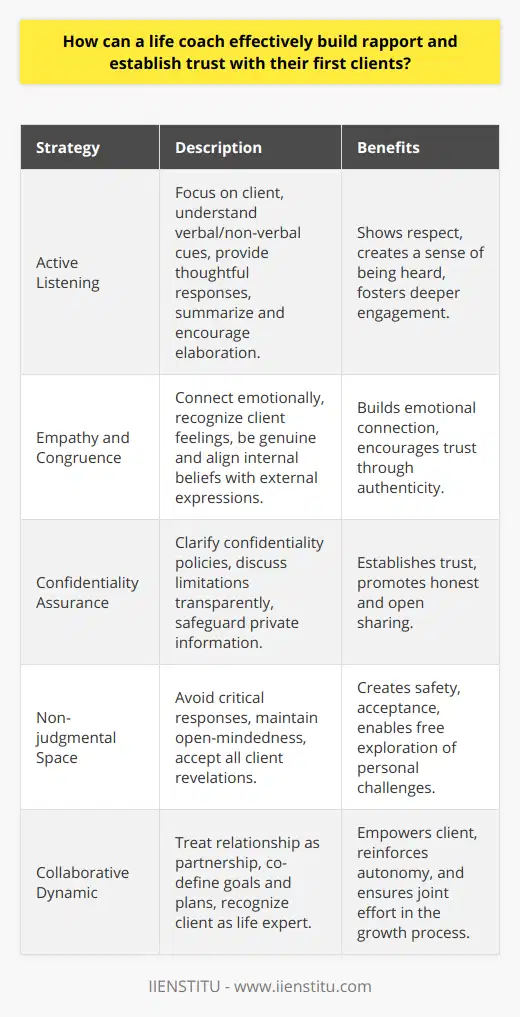
What strategies can new life coaches utilize to ensure continuous client acquisition and growth in their practice?
Effective Marketing Techniques
To ensure continuous client acquisition and growth in their practice, new life coaches should implement effective marketing strategies that showcase their unique value proposition, resonate with their target audiences, and deliver results. By leveraging digital marketing tools and platforms, new life coaches can create engaging online content, manage their online reputation, and connect with potential clients through social media channels and communities.
Personal Branding
Developing a strong personal brand is crucial for life coaches who aspire to establish expertise, credibility, and trust within their niche. This process involves crafting a compelling narrative, articulating core values, and consistently demonstrating expertise through thought leadership, such as blogging, podcasting, and speaking engagements. An authentic and consistent personal brand can help new life coaches attract the right clients, stand out from the competition, and generate referrals.
Networking and Collaboration
In addition to online marketing and personal branding, life coaches should invest in building strategic relationships within their industry and community. By attending industry conferences, local networking events, and collaborating with complementary service providers, life coaches can expand their professional network, gain valuable insights from experienced practitioners, and access new client leads through cross-promotion or word-of-mouth referrals.
Client Retention Strategies
To foster sustainable growth, new life coaches should prioritize forming long-term relationships with their clients. This encompasses offering excellent client service, setting clear expectations, and maintaining regular communication channels. Moreover, life coaches should invest in continuous professional development to improve their coaching skills and techniques, stay updated on industry trends, and meet clients' evolving needs.
Tracking and Evaluation
Lastly, life coaches should utilize data-driven approaches to monitor their client acquisition efforts, analyze progress, and optimize their strategies accordingly. By consistently evaluating the effectiveness of marketing campaigns, personal branding initiatives, and networking activities, life coaches can identify opportunities for improvement and align their efforts with their business goals.
In conclusion, continuous client acquisition and growth for new life coaches requires a multifaceted approach, combining effective marketing techniques, strong personal branding, strategic networking, exemplary client service, and consistent self-evaluation. By prioritizing these strategies, life coaches can build a thriving and sustainable coaching practice.
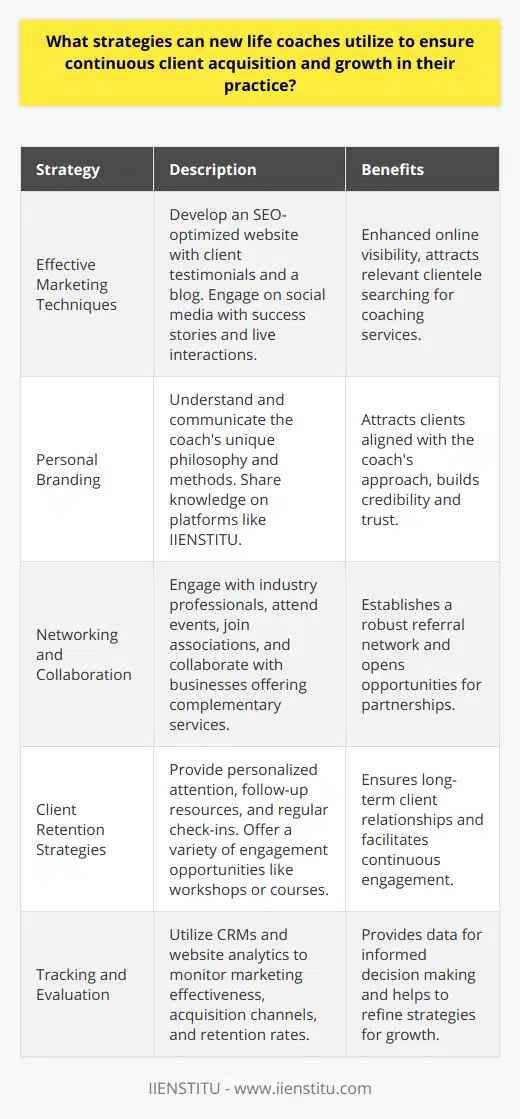
What foundational skills and techniques should beginner life coaches focus on developing to enhance their effectiveness in working with clients?
Foundational Skills for Effective Life Coaching
Active Listening:
For beginner life coaches, developing active listening skills is crucial in understanding clients' needs, concerns, and motivations. Active listening involves giving full attention to the speaker, noting verbal and non-verbal cues, and avoiding interruption or judgment.
Powerful Questioning:
Asking thought-provoking questions helps clients interpret their thoughts and feelings. Practicing powerful questioning with open-ended inquiries encourages clients to explore deeper insights and foster awareness needed for meaningful change.
Empathy and Rapport:
Life coaches must develop empathy, the ability to understand and share clients' emotions, to create strong rapport. Building an empathetic connection helps life coaches validate clients' experiences, encourage vulnerability, and offer relevant guidance and support.
Goal Setting and Accountability:
Beginner life coaches should excel at helping clients set realistic, measurable goals and create action plans for achieving them. Ensuring clients are accountable for their progress by scheduling regular check-ins can promote motivation and a sense of accomplishment.
Solution-Focused Techniques:
Many life coaching clients seek practical solutions to address challenges. Developing a solution-focused mindset helps beginner coaches guide clients out of discouragement and stagnation, enabling them to shift their focus from problems to solutions and action steps that can ultimately enhance personal progress and growth.
Adaptable Communication:
Life coaches communicate with a diverse clientele, requiring adaptable communication skills. Coaches should be proficient at adjusting their communication style to match the pace, language, and tone that the client responds to best. This skill increases rapport, understanding, and effectiveness of the coaching process.
Continuous Professional Development:
Finally, life coaches should engage in ongoing professional development efforts, including seeking mentorship, attending workshops and conferences, and pursuing industry-related credentials. Staying updated with industry best practices helps maintain credibility and ensures that coaches provide the most effective coaching techniques for their clients.
In conclusion, beginner life coaches can enhance their effectiveness by developing foundational skills such as active listening, powerful questioning, empathy and rapport, goal setting, solution-focused techniques, adaptable communication, and continuous professional development. Mastering these competencies sets the stage for a successful and fulfilling career in the life coaching field.
